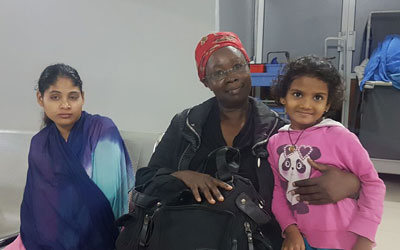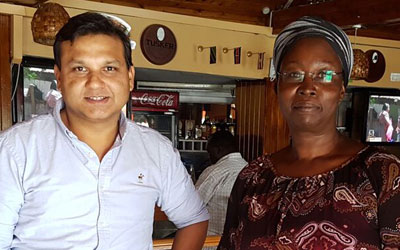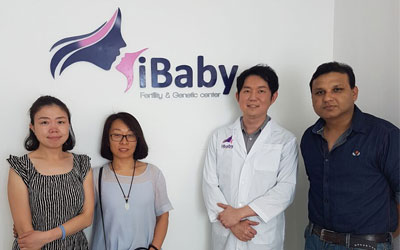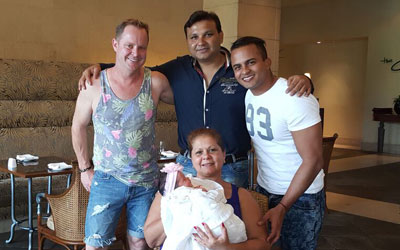Gestational Surrogacy by Surrogacy Kenya

While the number of couples affected by various challenges related to infertility is increasing around the world, many of them are eventually turning to the option of surrogacy. Furthermore, when it comes to surrogacy as a choice, gestational surrogacy in Kenya has been the most popular.
The term “gestational surrogacy” refers to a surrogacy arrangement in which the surrogate mother has no genetic ties to the child she is carrying.
The uterus of a surrogate mother in Kenya is used to produce and develop the embryo via the In Vitro Fertilization (IVF) method, using eggs and sperm from the intended parents or donors, and then placing them in the uterus of the Surrogate Mother.
In this form of the surrogacy agreement, both the intended parents are biologically related to the kid, while the surrogate mother has no genetic relationship to the child. This may be one of the reasons why this arrangement has become the most popular Surrogacy procedure on the globe.
What is the procedure for gestational surrogacy in Kenya?
Finding a Surrogate mother in Kenya, completing the necessary agreements, and proceeding with the embryo transfer to the surrogate mother’s uterus is all part of gestational surrogacy in Kenya.

Furthermore, it is primarily up to the intended parents to decide if they want to go it alone in locating a surrogate and dealing with the situation with the assistance of an attorney specializing in assisted reproductive legislation. Still, the majority of people prefer to do it with the help of the best surrogacy agency in Kenya, which will take care of everything from locating a surrogate to screening them and ensuring that the legal elements are taken care of as well.
The most frequent type of surrogacy nowadays is gestational surrogacy, wherein the surrogate is not connected to the child she is carrying. While data on gestational surrogacy are hard to come by, this route to motherhood has successfully helped couples and individuals expand their families, and it is becoming more prevalent.
The child born through gestational surrogacy in Kenya is not biologically connected to the surrogate mother, who is also known as a gestational carrier. In vitro fertilization (IVF) is used to develop the embryo, which is then transferred to the surrogate using the intending parents’ or donors’ eggs and sperm.
“Host surrogacy” or “full surrogacy” is terms used to describe this type of surrogacy. In most cases, at least one intended parent and the surrogate are genetically linked to the child. Because foster parent or second-parent adoption is not necessary, surrogacy in Kenya is less legally complicated than other types of surrogacy.
The following individuals may be interested in gestational surrogacy:
- Those who have struggled with infertility in the past
- Single parents with child seeking ambitions
- Same-sex couples
- People who don’t want their child to have a genetic relationship with the surrogate
- Anyone who is unable to carry a pregnancy to term in a safe manner
How does gestational surrogacy work?
Most articles you read about the surrogacy procedure refer to gestational surrogacy in Kenya because it is the most popular type of surrogacy across the globe today. Finding a surrogacy option, signing legal paperwork, and transferring the embryo to the surrogate are all part of the gestational surrogacy procedure.
Intended parents can search for a surrogacy option on their own and work with an attorney who specializes in assisted reproductive law to seek independent surrogacy. Most intended parents, on the other hand, prefer to deal with a full-service surrogacy clinic in Kenya to find a gestational surrogate.
Once a match is made, the surrogate and intended parents will meet with an attorney to explain legal problems and duties, as well as surrogate remuneration. A fertility clinic will handle the IVF and embryo transfer process if everyone is in agreement and the papers are finalized. One of the following methods will be used to generate an embryo and transfer it to the surrogate:
- The intended parents’ eggs and sperm, in which case the child will be genetically connected to both intended parents.
- If a donated egg is fertilized with sperm from the intended father, the kid will be biologically connected to the intended father.
- If the intended mother’s egg is fertilized with donor sperm, the kid will be biologically connected to the intended mother.
- A donor embryo or one generated with donor eggs and sperm, in which case neither intended parent is biologically linked to the child.
The surrogate will then bear the baby as if it was any normal pregnancy, and the intended parents will receive full legal guardianship of their kid when he or she is delivered.
The gestational surrogacy process may differ according to the state’s legislation, your personal situation, and other factors. Still, when it comes to Kenya, the agreement is not enforceable by law given the absence of proper surrogacy legislation.
What are the various laws related to Gestational surrogacy?
Surrogacy is a relatively new practice, and the rules surrounding it are still unclear and convoluted. Intended parents and surrogates should each have their own legal counsel to guide them through the procedure and defend their rights.
While surrogacy law might be intricate, the legal process according to gestational surrogacy law in Kenya is frequently less so. At least one spouse is frequently biologically connected to the kid through gestational surrogacy, which makes custody concerns easier.
Each state’s surrogacy regulations are different, and some states do not authorize surrogacy at all. Regardless of where you live, your expert or attorney can assist you in understanding the gestational surrogacy legislation in your state and completing the surrogacy procedure.
As far as Surrogacy Kenya is concerned, we will help you get through the entire process without any hassle or legal issues. Our partnered IVF clinics in Kenya and the associated fertility experts are backed by years of experience and expertise in dealing with any given case scenario.
What is the cost of gestational surrogacy in Kenya?
The cost of surrogacy in Kenya is determined by a variety of factors. Surrogacy may be a long and difficult process involving a variety of specialists, cutting-edge medical equipment, and a year-long commitment from a woman ready to carry a child for another family.
Surrogacy costs in Kenya would vary in terms of the procedure brought into use. All essential medical costs, attorney fees, counseling costs, service charges, and surrogate living costs, and remuneration are included in this total cost. Most of these costs are subject to change; for example, the surrogate mother’s monthly payment may differ depending on where she resides, and legal costs may differ based on state legislation and court processes.
Surrogate mother in Kenya prefers to live with their families so the intended parents can save on this cost most of the time. Yet Surrogate motherhouse in Kenya is available to tackle any such situation related to surrogate accommodation.
Furthermore, insurance may not cover medical costs for intended parents and their surrogates, and intended parents have lesser funding options than adoptive families. Intended parents should consult with our surrogacy coordinator to get a more precise estimate of their surrogacy costs and budget accordingly.
The Benefits and Drawbacks of Gestational Surrogacy
Although gestational surrogacy has numerous benefits that make it a common choice among intended parents, there are a few drawbacks to contemplate. Some of the most prevalent advantages and disadvantages of gestational surrogacy are as follows:
Benefits of Gestational surrogacy
- Childless couples, single parents, and members of the LGBT community can all benefit from gestational surrogacy.
- Intended parents can keep a genetic bond with their kids through gestational surrogacy.
- Surrogacy allows intended parents to form a special connection with their surrogate mother.
- Because the child is not linked to the gestational carrier, gestational surrogacy is the least arguably difficult form of surrogacy.
Drawbacks of Gestational surrogacy
- Gestational Surrogacy is typically a time-consuming and costly legal process.
- In order for gestational surrogacy to work, intended parents must surrender some authority over the pregnancy while someone else bears it for them.
- If the intended mother is utilizing her own eggs for surrogacy, she will need fertility treatments and other medical procedures.
Many of the advantages and disadvantages of gestational surrogacy in Kenya also apply to other types of surrogacy. Before starting the gestational surrogacy procedure, potential intended parents should examine the various types of surrogacy and carefully evaluate all of the included risks and challenges.
How Surrogacy agency Kenya can offer you the best Gestational Surrogacy services?
Surrogacy Kenya has been in business for over ten years and has assisted over 600+ families in realizing their long-awaited “Parenting Dreams.” We’ve worked with many couples and provide Gestational surrogacy in Kenya and all over the world, including Australia, China, Ireland, South Africa, South Korea, Ukraine, the United States, Israel, the United Kingdom, Spain, Canada, and New Zealand.
Because our founders are Intended Parents themselves, we understand the emotional stress, anguish, and difficulty that our clients face during the process, which is why we make every effort to guarantee that they have the finest and most seamless surrogacy experience possible.





No Comments